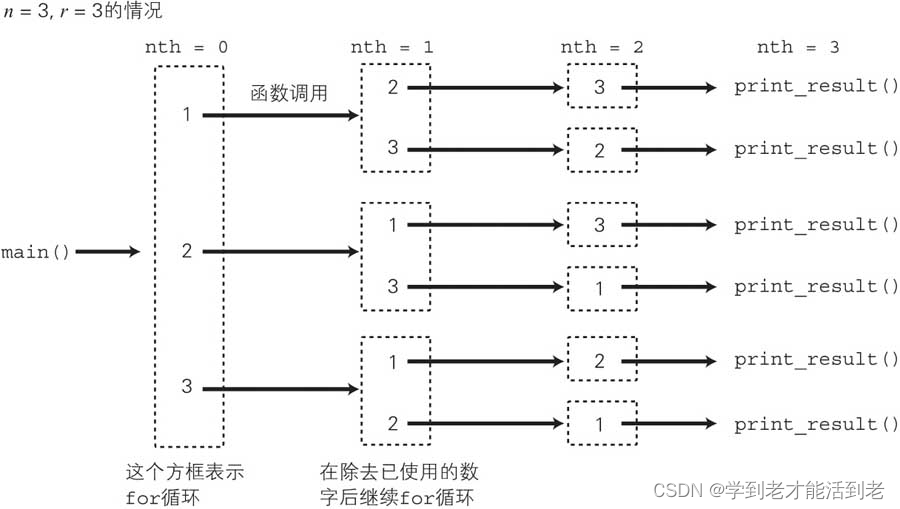题目:从数字1~n中选取r个数字并将其排列,输出所有的排列结果,顺序不同也视为不同的排列。其中n和r为输入的参数:
例如:从数字1~5中选取3个数字时的排列为如下的60中情况:
1 2 3, 1 2 4, 1 2 5, 1 3 2, 1 3 4, 1 3 5, 1 4 2, 1 4 3, 1 4 5, 1 5 2, 1 5 3, 1 5 4,
2 1 3, 2 1 4, 2 1 5, 2 3 1, 2 3 4, 2 3 5, 2 4 1, 2 4 3, 2 4 5, 2 5 1, 2 5 3, 2 5 4,
3 1 2, 3 1 4, 3 1 5, 3 2 1, 3 2 4, 3 2 5, 3 4 1, 3 4 2, 3 4 5, 3 5 1, 3 5 2, 3 5 4,
4 1 2, 4 1 3, 4 1 5, 4 2 1, 4 2 3, 4 2 5, 4 3 1, 4 3 2, 4 3 5, 4 5 1, 4 5 2, 4 5 3,
5 1 2, 5 1 3, 5 1 4, 5 2 1, 5 2 3, 5 2 4, 5 3 1, 5 3 2, 5 3 4, 5 4 1, 5 4 2, 5 4 3解题:
#include <stdio.h>
/* n的最大值 */
#define N_MAX (100)
/* 若数字已被使用,则将下标为该数字的元素设成1 */
int used_flag[N_MAX + 1];
int result[N_MAX];
int n;
int r;
void print_result(void)
{
int i;
for (i = 0; i < r; i++) {
printf("%d ", result[i]);
}
printf("\n");
}
void permutation(int nth) // 参数nth表示当前正在处理第几个数字
{
int i;
if (nth == r) {
print_result();
return; // 注意这里返回的位置在哪
}
for (i = 1; i <= n; i++) {
if (used_flag[i] == 0) {
result[nth] = i;
used_flag[i] = 1;
permutation(nth + 1);
used_flag[i] = 0;
}
}
}
int main(int argc, char **argv)
{
sscanf(argv[1], "%d", &n);
sscanf(argv[2], "%d", &r);
permutation(0);
}Linux下执行输出如下:
gcc permutation.c -o permutation
./permutation 3 31 2 3
1 3 2
2 1 3
2 3 1
3 1 2
3 2 1

?
